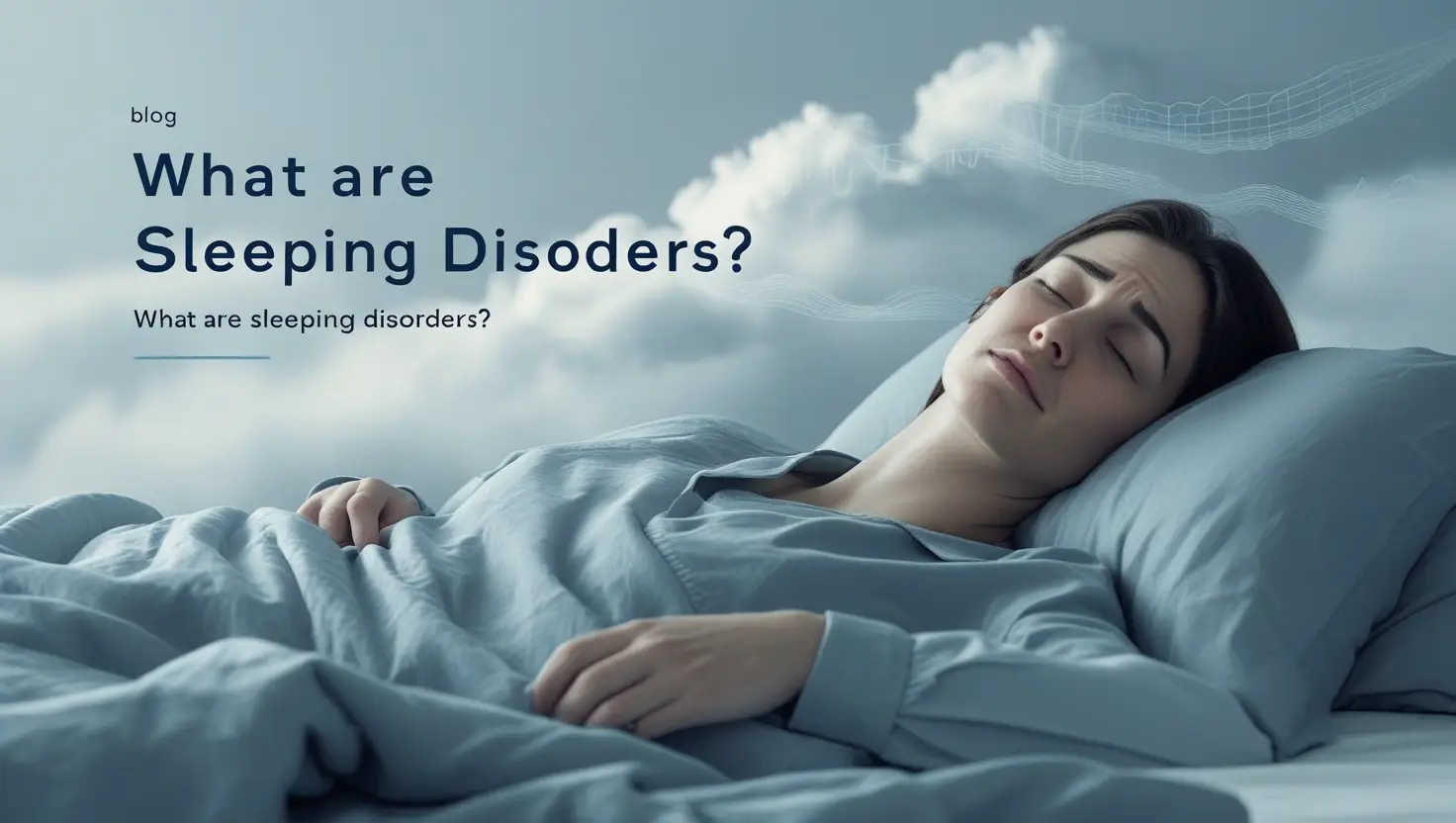Introduction to Sleeping Disorders
Have you ever found yourself tossing and turning, desperately trying to get a good night’s sleep? If so, you’re not alone. Sleeping disorders are more common than most people think, affecting millions globally. But what exactly are sleeping disorders? In simple terms, they are conditions that disrupt your ability to sleep well regularly. When you don’t get enough rest, your overall health and well-being can suffer, making it crucial to address these issues.
Detailed Types of Sleeping Disorders
The International Classification of Sleep Disorders (ICSD-3R) categorizes sleeping disorders into several groups, each with distinct characteristics. Below is a detailed breakdown of the most common types, including definitions, symptoms, causes, and treatments, based on recent medical insights.
| Disorder | Definition | Symptoms | Causes | Treatment Options |
|---|---|---|---|---|
| Insomnia | Difficulty falling or staying asleep, leading to inadequate rest. | Fatigue, irritability, difficulty concentrating. | Stress, anxiety, medical conditions, poor habits. | CBT, sleep hygiene, medication if needed. |
| Obstructive Sleep Apnea (OSA) | Airway collapse during sleep, causing breathing pauses. | Loud snoring, gasping, excessive daytime sleepiness. | Obesity, large neck, facial structure, genetics. | CPAP machines, weight loss, surgery if severe. |
| Restless Legs Syndrome (RLS) | Uncontrollable urge to move legs, often with uncomfortable sensations. | Crawling, itching sensations, worse at night. | Iron deficiency, pregnancy, medications, genetics. | Iron supplements, dopamine agonists, gabapentinoids. |
| Narcolepsy | Excessive daytime sleepiness with sudden muscle tone loss (cataplexy). | Sleep attacks, cataplexy, sleep paralysis, hallucinations. | Hypocretin deficiency, possibly genetic. | Stimulants, antidepressants for cataplexy. |
| Hypersomnia | Excessive sleepiness despite adequate sleep time. | Difficulty waking, prolonged sleep, unrefreshed feeling. | Idiopathic or secondary to other conditions. | Manage underlying causes, wakefulness medications. |
| Circadian Rhythm Disorders | Body’s internal clock out of sync with environment, affecting sleep-wake cycle. | Difficulty falling asleep, waking early, daytime sleepiness. | Shift work, jet lag, genetic factors. | Adjust schedules, light therapy, medication. |
| Parasomnias | Abnormal behaviors during sleep, like sleepwalking or night terrors. | Sleepwalking, talking, night terrors, unusual actions. | Stress, sleep deprivation, medical conditions. | Improve sleep hygiene, address causes, medication if needed. |
This table summarizes the key aspects, providing a structured overview for easy reference. Each disorder’s impact can vary, with some being more prevalent in certain age groups or demographics, such as RLS being more common in middle-aged women.
Causes of Sleeping Disorders
Many factors contribute to the development of sleeping disorders. These can range from lifestyle habits to underlying medical conditions.
- Psychological Factors: Stress, anxiety, and depression can significantly affect your ability to sleep. Overthinking or worrying can lead to insomnia, while feelings of sadness or hopelessness can disrupt your sleep patterns.
- Physical Factors: Conditions like asthma, arthritis, and chronic pain can interfere with sleep. Pain and discomfort may keep you awake or cause frequent waking during the night.
- Environmental Factors: Noisy environments, uncomfortable temperatures, or disruptive lighting can make it hard for your body to relax and fall asleep. A poor sleep environment can contribute to insomnia or restless nights.
- Lifestyle Choices and Habits: Eating heavy meals late at night, drinking caffeine or alcohol close to bedtime, and irregular sleep schedules can all negatively impact sleep quality. Lack of physical activity can also make it harder to fall asleep.
Symptoms and Signs to Look For
Recognizing the symptoms of a sleeping disorder is essential for getting the right help. Common signs include:
- Difficulty Falling Asleep or Staying Asleep: If you find yourself staring at the ceiling for hours or waking up multiple times throughout the night, it may be a sign of a sleep disorder.
- Excessive Daytime Sleepiness: If you constantly feel drowsy during the day despite getting enough sleep, it could indicate a disorder like sleep apnea or narcolepsy.
- Snoring or Gasping During Sleep: Loud snoring or episodes where you wake up gasping for air are often symptoms of sleep apnea.
- Uncontrollable Episodes of Sleep: Sudden episodes of sleep during the day, especially in situations where you need to stay alert, are typical of narcolepsy.
Risk Factors for Developing Sleeping Disorders
Several factors can increase your chances of developing a sleeping disorder, including:
- Age and Gender: Older adults are more prone to sleep disorders, particularly insomnia. Additionally, women are more likely to experience conditions like insomnia and RLS.
- Medical Conditions: Conditions like heart disease, diabetes, and depression can all increase the risk of developing a sleep disorder.
- Family History: A family history of sleep disorders can make you more susceptible to developing one yourself.
- Stress and Anxiety: High levels of stress or anxiety can interfere with sleep, leading to insomnia or other disorders.
Diagnosis of Sleeping Disorders
If you’re struggling with sleep, a visit to a healthcare provider is essential. They may recommend several diagnostic tools, such as:
- Sleep Studies: These tests monitor your sleep patterns and can help diagnose conditions like sleep apnea or narcolepsy.
- Polysomnography: A more detailed study where electrodes are placed on your body to track brain waves, heart rate, and other factors while you sleep.
- When to Seek Help: If your sleep problems persist for more than a few weeks, or if they interfere with your daily life, it’s time to consult a doctor or sleep specialist.
Treatment Options for Sleeping Disorders
There are many ways to treat sleeping disorders, depending on the specific condition. Some common treatments include:
- Behavioral Therapies: Cognitive Behavioral Therapy (CBT) is often used to treat insomnia by helping you identify negative thoughts and behaviors that affect sleep.
- Medications and Sleep Aids: Doctors may prescribe medications such as sleeping pills or CPAP machines for sleep apnea.
- Lifestyle Changes: Improving your sleep environment, setting a regular bedtime, and avoiding caffeine can make a big difference in sleep quality.
- Alternative and Natural Remedies: Techniques like aromatherapy, acupuncture, or herbal supplements (such as melatonin) may help promote relaxation and improve sleep.
Prevention of Sleeping Disorders
While some sleep disorders are beyond your control, there are steps you can take to prevent them:
- Establishing Healthy Sleep Habits: Stick to a regular sleep schedule, avoid naps during the day, and limit screen time before bed.
- Managing Stress and Anxiety: Practice relaxation techniques such as deep breathing, meditation, or yoga to reduce stress.
- Creating a Sleep-Friendly Environment: Keep your bedroom quiet, dark, and cool to promote better sleep.
Impact of Sleeping Disorders on Overall Health
Chronic sleep deprivation can have serious consequences for both mental and physical health, including:
- Mental Health Implications: Sleep disorders are closely linked to mood disorders like depression and anxiety.
- Physical Health Consequences: Lack of sleep can increase the risk of heart disease, obesity, and diabetes.
- Impact on Daily Functioning and Productivity: Poor sleep can affect your ability to focus, make decisions, and perform tasks efficiently.
Coping Mechanisms for Those Affected
If you’re dealing with a sleep disorder, it’s essential to have coping mechanisms in place:
- Support Networks: Reach out to family or friends for support. Talking about your struggles can help alleviate stress.
- Mindfulness and Relaxation Techniques: Practices like meditation and progressive muscle relaxation can calm your mind and prepare you for better sleep.
- Seeking Professional Support: Don’t hesitate to consult a professional for tailored treatment options.
When to Seek Professional Help
If your symptoms persist or worsen, or if your sleep disorder is severely affecting your quality of life, it’s time to consult a sleep specialist. Getting professional help can lead to better diagnosis and treatment, improving your overall well-being.
Common Myths About Sleeping Disorders
There are many misconceptions about sleeping disorders, such as:
- Myth: You can “catch up” on sleep during the weekend.
- Fact: While it’s important to sleep more on the weekend, you can’t completely make up for lost sleep during the week.
- Myth: Snoring is just a nuisance, not a sign of a health problem.
- Fact: Snoring, especially when accompanied by gasping or choking, could be a sign of sleep apnea, a serious condition.
The Future of Sleeping Disorders Treatment
Advances in sleep medicine are paving the way for more effective treatments. From new sleep aids to innovative therapies, the future looks promising for those struggling with sleep disorders.
Conclusion
In conclusion, sleeping disorders are common yet highly treatable conditions. By recognizing the symptoms, understanding the causes, and seeking professional help, you can improve your sleep and overall health. Don’t let sleep issues control your life—take the first step toward better sleep today!
FAQs
- What is the most common sleeping disorder?
- Insomnia is the most common sleep disorder, affecting millions globally.
- Can stress cause sleep disorders?
- Yes, stress and anxiety can significantly affect your ability to fall asleep and stay asleep.
- How do doctors diagnose sleep apnea?
- Doctors may use sleep studies or polysomnography to diagnose sleep apnea.
- Is it safe to use sleep medication regularly?
- Sleep medications should only be used under the guidance of a healthcare provider, as they can have side effects and lead to dependency.
- Can poor sleep affect mental health?
- Yes, chronic sleep deprivation is closely linked to mental health issues like depression and anxiety.


